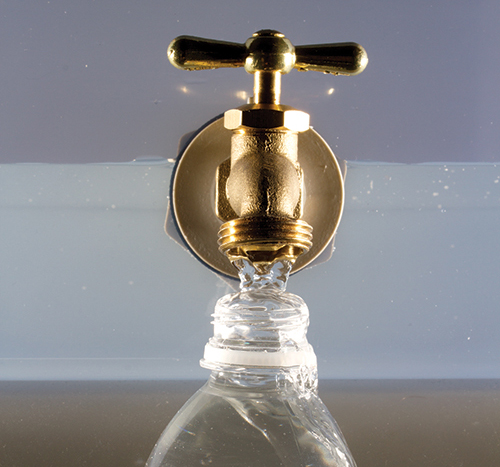Despite the abundance of water we are currently experiencing here in Portland, the sad truth is that the planet’s water is quickly disappearing. And, as we all know, water is essential to life on our planet.
Local water, up for sale
Photo by Karl Kuchs.
Despite the abundance of water we are currently experiencing here in Portland, the sad truth is that the planet’s water is quickly disappearing.
And, as we all know, water is essential to life on our planet.
The Gravity Recovery and Climate Experiment, used by NASA to measure variations in the planet’s magnetic sphere, has also been used to monitor groundwater levels since 2002.
GRACE data is showing that groundwater levels—the amount of water available in aquifers—has dropped by about 20 percent in that time period. This is an alarming fact made worse by the implications of a water shortage. Over the past few years, more droughts have occurred in more regions across the globe.
Given that water is quickly proving to be a valuable and scarce resource, how should we, as a community, use our water? Should we use what we have to increase our regional economic viability? Or should we try to conserve our water, ensuring that it is there for future generations?
The aquifer serving the Oregon town of Cascade Locks is one of the remaining aquifers in the region with an ample supply of water. This aquifer is the focus of a three-year-long battle still being fought in our state.
Switzerland-based Nestle Group, famous for their chocolate, would like to build a new bottling facility for their Pure Life and Arrowhead brands of water in Cascade Locks, thereby increasing the economic viability of the town.
Bruce Sorte, an economist at Oregon State University, recently concluded in his economic analysis that the new facility would nearly double the economic output of the city. However, the water they want to bottle—and subsequently sell outside our region—is currently managed by the Oregon Department of Fish and Wildlife because it is a thermal refuge for steelhead salmon, a protected species. ODFW also uses the water to manage the Oxbow Hatchery for this and other species of fish.
If we allow our precious water to be sold at discounted rates—the current rate for municipal water in Cascade Locks is one-fifth of a cent per gallon—and then exported and sold at current market rates, we set a dangerous precedent. Such a decision would signal that we feel that whatever common resources we have are for sale and that, as long as we are paid, nothing is too important to be sold off.
While I normally do not take a protectionist stance on economic issues, I feel that in this case the risk to our region is too great.
If the current trend documented by GRACE continues, we will quickly find
ourselves either without water or unable to afford what little is available.
While I am sure the town of Cascade Locks would benefit from the increased economic activity the plant would provide, what happens when the water runs out? Will Nestle stay around and continue to provide jobs in the area, or will they pack up and move elsewhere to repeat the cycle? Given that there have been no guarantees that Nestle would stick around, or that the jobs provided would even go to local residents, we should be very cautious about what we do with our limited resources.
The environmental costs are too large to be ignored in this situation. With the removal of so much water from the Oxbow spring and aquifer, the hatchery may be unable to support the fish population it has, the thermal refuge for steelhead could disappear and, in time, the local community may be hard-pressed to provide enough water for their own use.
We, as a state, region and community, simply cannot afford these costs—not when the profits of the sale of our resource will not be used to benefit our community. We should all join together and tell ODFW that we do not approve of our precious water being sold and taken out of our community. We do not approve of the plan to eliminate one of the last thermal refuges for steelhead. We do not want the water that feeds our fish hatcheries being bottled at discounted rates and then sold at a premium.
On Feb. 8, ODFW will hold a meeting that will help to end this long battle. We need to show our support for our community and tell ODFW that we say “No!”







